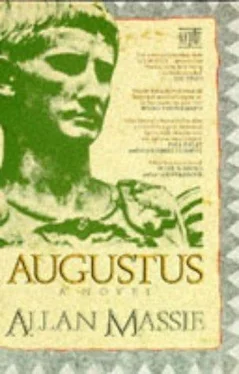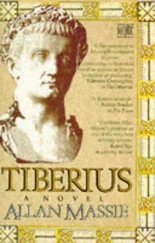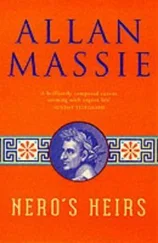Allan Massie - Augustus
Здесь есть возможность читать онлайн «Allan Massie - Augustus» весь текст электронной книги совершенно бесплатно (целиком полную версию без сокращений). В некоторых случаях можно слушать аудио, скачать через торрент в формате fb2 и присутствует краткое содержание. Жанр: Исторические приключения, на английском языке. Описание произведения, (предисловие) а так же отзывы посетителей доступны на портале библиотеки ЛибКат.
- Название:Augustus
- Автор:
- Жанр:
- Год:неизвестен
- ISBN:нет данных
- Рейтинг книги:4 / 5. Голосов: 1
-
Избранное:Добавить в избранное
- Отзывы:
-
Ваша оценка:
- 80
- 1
- 2
- 3
- 4
- 5
Augustus: краткое содержание, описание и аннотация
Предлагаем к чтению аннотацию, описание, краткое содержание или предисловие (зависит от того, что написал сам автор книги «Augustus»). Если вы не нашли необходимую информацию о книге — напишите в комментариях, мы постараемся отыскать её.
Augustus — читать онлайн бесплатно полную книгу (весь текст) целиком
Ниже представлен текст книги, разбитый по страницам. Система сохранения места последней прочитанной страницы, позволяет с удобством читать онлайн бесплатно книгу «Augustus», без необходимости каждый раз заново искать на чём Вы остановились. Поставьте закладку, и сможете в любой момент перейти на страницу, на которой закончили чтение.
Интервал:
Закладка:
Perhaps not, for it breaks off abruptly, though there was no good reason for ending Book I with the defeat of Antony. It would indeed have seemed more suitable to end it with the celebration of his Triumph in 29, but that awaits description till the second chapter of Book II. One surmises therefore that it was discontinued on account of the onslaught of the family disasters which befell Augustus from 5 BC and which are movingly chronicled in the final chapters of Book II. It seems therefore appropriate to limit my observations here, and resume them with an editorial preface to that second Book when the reader has had the chance to enjoy the happy buoyancy of the Emperor's letter to his beloved grandsons; for Book I essentially offers us just that: the chance of hearing Augustus address these two boys; accordingly it offers also an invitation to intimacy rare, well-nigh unique, in our reading of the Ancient World.
One final note: dates are given, in this introduction and in the text, according to our modern system of dating. This is unscholarly. Augustus of course dated events a.u.c. (Ab urbe condita: from the foundation of the City). Mr Massie however urged that we should employ the system BC and AD, on the frivolous grounds that 'everyone understands it and it seems less remote'. I protested at the absurdity, but reluctantly gave way when the publisher added his pleas to the translator's.
Meanwhile: Princeps ipse loquatur!: Let the Emperor himself speak!
A. F-G
I am afraid my father's account of his Gallic Wars is among the dullest books ever written. I remember, Gaius, how your tutor once expressed indignation when you complained of its tedium. But you were quite right though it seemed to me then inexpedient to admit as much, and I only suggested to your tutor that he make due allowance for the ardour of youth. One reason why it is unsatisfactory is Caesar's pompous tone, and this owes much to his unfortunate decision to write of himself in the third person: 'Caesar did this, Caesar did that, Caesar acted to save the situation…'; it grows more wearisome and seems even more self-admiring than the perpetual 'I' of autobiographers.
Then that much-praised first sentence: 'All Gaul is divided into three parts', has really only the single virtue of lucidity. It is far from accurate, for the divisions of Gaul are more numerous and much deeper than he suggests.
In fact the book is fundamentally untruthful. Not surprising; it was written for an immediate political purpose – when did a manifesto ever speak the truth? The Triumvirate formed by Caesar, Pompey and Crassus had broken up. Caesar's enemies in Rome were baying for his blood and demanding his recall. He appealed to public opinion with this vainglorious account of his Gallic conquests: he would show them what he had done for Rome. It worked. Even the dullness of which you complained was deliberate; many had thought Caesar flashy; now they should be soothed by the impressive sobriety of his prose.
So, my dear Gaius, and Lucius, too, (for I cannot imagine your tender imagination responded to Caesar's prose, though you would be too mild and mannerly to complain) your early criticism was justified. 'On the spot', as you would say yourself. It has always seemed to me an example of how not to write your memoirs. There is no personal voice. What you hear is an actor. Of course it's also true that Julius Caesar was always acting: the real Caesar, if he existed by the time I knew him, was buried deep beneath layers of artifice. Still, most of the parts he chose to play were livelier and wittier than the role he wrote for himself in his 'Gallic War'.
All the same, now that I bring myself to write this account of my own life, for you – for your instruction and, I hope, pleasure – I confess that the pompous tone is hard to avoid. Autobiography sets out to recapture experience, but the business of writing it requires the author to abstract himself from the self that lived these experiences, and to construct a figure that can hardly fail to be, as it were, theatrical. To put it another way: the self you write is never quite the self that lived. (I hope you don't find that concept too difficult. It's a modern idea of course which you certainly won't find in the authors you have studied and I am only too sadly aware of the inadequacy of my attempts at philosophical exposition.) I was anyway struck with this when I wrote a first sketch of my life about twenty years ago when I was stuck in a small town in the Pyrenees recovering from an illness. I found it heavy going, I assure you. It began, if I recall, with a genealogical chapter. Everyone is interested in his ancestry of course, but I could not bring mine to life. It was profoundly unsatisfactory.
So, engaging on this book for you, my boys, I propose to imitate Homer or follow his advice at least. He recommends you start in the middle of action.
Therefore: here we are: Greece, late March, blustery and cold, snow on the mountains, in my nineteenth year.
As we lay in the rest-room after our baths Maecenas ran his hand over my thigh.
'You see, my dear, I was quite right. Red-hot walnut shells are absolutely it. You have such pretty legs, ducky, it's a shame to spoil them with fuzz.' And then, with his hand still stroking me just above the knee, and Agrippa snorting something about bloody effeminate dirt from the next couch – then – it is a scene I hold clear as a vase-painting – the curtain was thrown aside, and a slave burst in, with no ceremony at all. 'Which of you is Gaius Octavius Thurinus?' he cried.
'This one is,' Maecenas said, not moving his hand. But I sat up, shaking him off. When slaves forget their manners, all the more reason to behave decently. The man thrust a letter into my outstretched hand, and disappeared without waiting for a reward. (I know why he did that; he was aware he was the bearer of bad news – slaves always know what their missives contain, I suppose they check with the secretaries and it is passed down the line – but in this case of course he could hardly have failed to know what the whole world would ring of – and he had all the Greek superstitious fear of the fate that waits the bringer of evil tidings.) I turned it over. 'It's from my mother,' I said. 'Oh God,' Maecenas said, 'mothers.' 'That's no way to talk,' Agrippa said. 'Well, who's little Miss Good Citizen now?'
Their bickering is memory's sour accompaniment to the solo of my mother's letter. It was short enough for something that shook the world: My son, your uncle Julius was this day murdered in the Senate House by his enemies. I write that bluntly because there is no way to prepare such news. And I say merely 'his enemies' because all here is uncertainty. No one knows what may happen, whether this is the beginning of new wars or not. Therefore, my child, be careful. Nevertheless the time has come when you must play the man, decide and act, for no one knows or can tell what things may now come forth. I let the letter drop. (One of the others picked it up and what they read silenced them.) I let my fingers play over my smooth legs and bare chin, and wondered if I was going to cry. I have always cried easily, but I had no tears for Julius either then or later.
Very soon there was a clamour without. We dressed hurriedly in some apprehension. One does in such circumstances. No one likes to be caught naked when there is danger of sword-play. My mind was full of all that I had heard and read of the proscriptions in the struggle between Sulla and Marius; how Julius himself had nearly lost his life then, for, said Sulla, 'in that young man there are many Mariuses.' I could not be certain that the slave who had brought the message was not the precursor of those who had constituted themselves my enemies as well as Julius's. I was his next-of-kin; it would make sense to dispose of me. I was indeed prudent to have such fears, for my death would have been an act of prudence on their part.
Читать дальшеИнтервал:
Закладка:
Похожие книги на «Augustus»
Представляем Вашему вниманию похожие книги на «Augustus» списком для выбора. Мы отобрали схожую по названию и смыслу литературу в надежде предоставить читателям больше вариантов отыскать новые, интересные, ещё непрочитанные произведения.
Обсуждение, отзывы о книге «Augustus» и просто собственные мнения читателей. Оставьте ваши комментарии, напишите, что Вы думаете о произведении, его смысле или главных героях. Укажите что конкретно понравилось, а что нет, и почему Вы так считаете.












